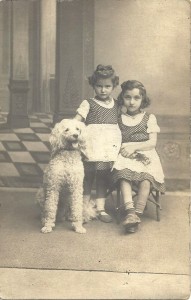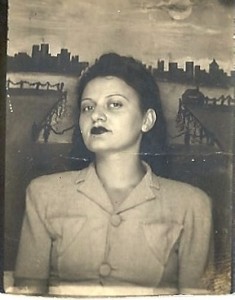
One of the things that most interests me about my family history is the “before” and “after” of my mother’s life. I wonder what effect being forced to leave Vienna — especially without her parents — had on Rita Rosenbaum Jarolim’s personality. I’ve always imagined the impact must have been profound.
But I may be wrong. Two pictures and a tale of teasing by the Kornmehl butcher uncles tell another story.

A Previous Rita
The Rita Jarolim I knew was nervous, overprotective… she worried about everything, particularly her children. She was not comfortable in most social situations. I don’t recall her ever having a friend. But she was no shrinking violet when it came to expressing opinions to family members about everything from politics to how our lives should be run. And my childhood friends, who have been weighing in with memories of my mother since I started blogging about her, recall her as being intelligent and a definite presence.
I initially thought that these instances of boldness are vestiges of my mother’s “before” personality, one largely destroyed by her imposed exile. This idea is supported by the picture of my mother and her cousin, Stella Schmerling, with a standard poodle named Flooki. My mother always claimed to dislike dogs and I got the sense she was afraid of them. But the intense little girl staring straight into the camera does not look like she is afraid of Flooki — or anything else. It’s difficult to read her expression but neither it nor her body language suggest shyness. In contrast, cousin Stella has a more hesitant look about her (click on the picture to get a larger view).
Incidentally, Stella is the cousin who, if family lore is to believed, was sent to see Sigmund Freud to try to cure a limp. Her problem with her leg — never resolved — might explain why she is sitting. Then again, it might be a question of photo composition. She looks taller than her cousin Rita.
Every Picture Tells A Story

It wasn’t until I started writing this blog that I began looking through my mother’s pictures, which had been stored away for the 20 years since she died. And it wasn’t until I began putting together pieces of our family story in the context of my growing knowledge of Austrian Jewish history that I began to make sense of what I saw.
Consider the picture to the left, shot in a photo booth in Coney Island in 1940 (isn’t the backdrop great?). My mother had been on her own in America for at least a year, and still barely spoke English. But the fashionable clothing, the plucked eyebrows, the bold lipstick and — dare I say it? — the seductive look don’t make it seem like the little girl with the poodle has been essentially changed. True, my mother still had hopes of bringing her parents over from Austria; it was not until 1942 that she learned the borders were closed and the money she had saved to wire their passage over could not be sent. But I have no evidence that this trauma profoundly altered her personality — whereas I do have a clue of a more complex part of her nature.
The Sheep’s Eyeballs
When I learned from Vienna’s Freud Museum site that the great uncle who was Freud’s butcher was named Siegmund, it was the first time I associated any of the family members besides my grandparents with specific identities. I realize now I was taking a cue from my mother, who always talked about the three male Kornmehl siblings as a unit. They were all butchers and they were simply “The Uncles.”
Being a butcher is an honorable trade and, from what I can gather, The Uncles lived well and prospered by it. I don’t know much yet about the third brother, Martin, but both Rudolph and Siegmund are noted for their work in providing food for Jewish charities. And in her memoir No Place Called Home, his granddaughter Gigi Michaels describes Rudolph as a good man.
But this research tore loose a memory of a story that my mother told: That she was a timid child, and The Uncles used to tease her for it. She once opened a gift box to find sheep’s eyeballs.
I’m not going to generalize by saying that being a butcher makes you brutal, as the stereotype goes. Maybe it doesn’t even make you less sensitive to the fears of children.
But it definitely gives you more access to sheep’s eyeballs than the average person has.
Here, then, is another side of my pre-Anschluss mother, belied by the two pictures I presented but buttressed by my first-hand experience of her. My mother was sufficiently timorous to make The Uncles know they could get a rise out of her.
I still don’t have any definitive answers about the effect my mother’s war experiences had on her. I don’t imagine I ever will — both for lack of information and because the nature vs. nurture debate has never been resolved. But I’m learning that my mother’s personality has always been a complex one, as is true of all of us. And that insight is certainly worth having when you’re trying to re-create a life.

multi-layered. evocative. there is a story here.
Thanks, Diane. A story, yes, though I’m not sure it’s a narrative.
Edie, I really enjoyed reading these thoughts and speculations about your mother’s personality. People are so complex. My first thought is a person who expresses strong opinions and is a “definite presence” can also have an extremely fragile self-image. I’m thinking of my own mother. By trying to understand and “heal” her as I was growing up, I learned how layered people can be.
I’m not saying that your mother was like my mother — who knows, really? But my mother was constantly teased by her 5 brothers, much older than she was. She lost her parents early — her father at 5, her mother when she was maybe 20. And she was always, always proving herself and filling the room with her commanding talk. It took me decades (and the structure of writing the family memoir) to figure out that she was a tortured soul who never found peace.
There’s one truth I keep stumbling across: People are good “hiders.” They know how to hide their insides from other people.
Oh! I finally got my Feedly to take your blog address! So I can find you regularly from now on.
I’m glad you enjoyed it, Marian. What you say about hiding makes sense. Isn’t it interesting how writing family histories can add dimensions to the people we thought we knew? And thanks for persevering with Feedly.